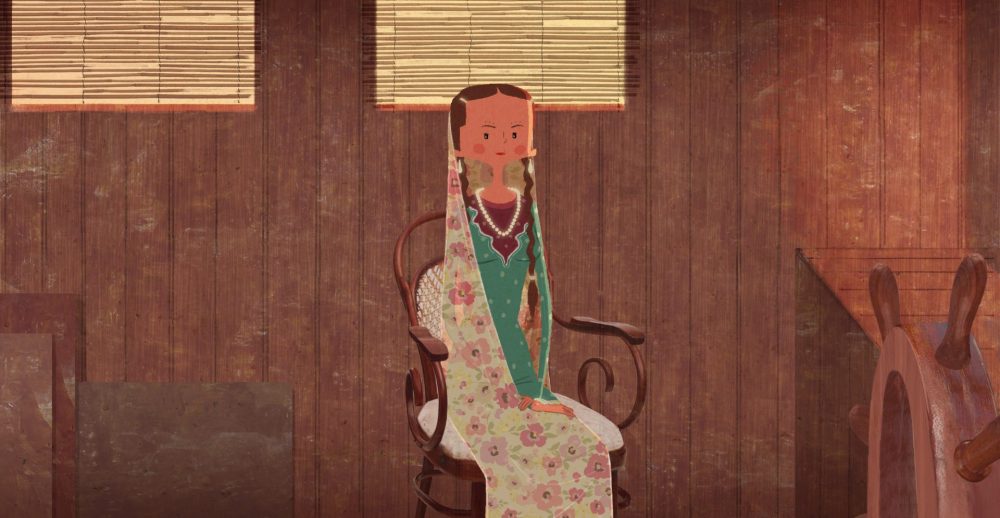Last year, director Yegane Moghaddam became the first Iranian director to get nominated for the Oscar for Best Animated Short for her acclaimed project, Our Uniform. This year, talented husband-and-wife artists and directors Hossein Molayemi and Shirin Sohani are hoping to follow in her footsteps with their powerful Annecy Cristal-nominated short, In the Shadow of the Cypress. Their beautifully crafted 2D short, which won the prestigious Best in Show prize at Toronto’s Spark Animation Festival last week, centers on a survivor of the Iran-Iraq war who is suffering from PTSD. The elderly boat captain lives with his daughter who has to cope with his troubled father and the challenges of daily life in a remote seaside town. (In addition, the short has also won Oscar-qualifying awards at Animayo and the L.A. Shorts Festival.)
Sohani and Molayemi began work on their short about six years ago, after finishing their previous project Run Rostam Run. “Both of us had personal life experiences that had deeply influenced our lives, and those were the main inspiration for the film,” the filmmakers tell Animation Magazine in an email interview. “In addition, there are many Iran-Iraq war veterans living in Iran who served as significant sources of inspiration for our work. Of course, the broader range of life experiences in Iran during the past 45 years made a big impact on the creation of our film.”
“We’re pleased that we persevered and managed to accomplish the nearly impossible task of creating such a significant production in Iran, despite our low budget, a shortage of skilled artists and a variety of other issues that we have to deal with every day in our country.”
- Directors Shirin Sohani and Hossein Molayemi
Difficult Lives, Troubling Times
To create the inner lives of the characters in the short, the directors looked at their own lives and those of family and friends. “I was inspired by my own relationship with my own father, as well as the fact that Shirin’s father was a war veteran,” says Molayemi. “In addition, there are many war veterans living in Iran who served as reference for the character in our short.”
The poignant slice-of-life snapshot was a labor of love for the duo. “The production of our film primarily relied on the skills of our artists rather than complicated animation tools and software, as it was a full 2D hand-drawn animated film, created frame by frame,” says Sohani. “We used ordinary and simple software to make our short. It is worth mentioning that while the project involved the participation of several individuals within a limited period of time, in practice, the majority of tasks were handled by three of us: the directors and one of the animators, Azad Maroufi, who worked closely with us from the initial stages of production until the final phase.”

The filmmakers say that producing animation in Iran under the bleak economic conditions and the many social crises of the past decade has taken its toll on the country’s artists . “It is difficult to fully convey the extent of the challenges we face here. The reality is far more complex and demanding than what words can express,” they explain. “Creating animation in Iran under the current circumstances is extremely challenging. For over four decades, Iranians have been suffering from economic issues, but the economic and social challenges of the past seven years have led to high levels of pressure, depression and a sense of hopelessness among artists. Additionally, many skilled artists have been forced to emigrate due to these difficult conditions.”
Apart from other challenges and difficulties, Molayemi mentions that he was struck by alopecia universalis, an autoimmune disorder, during the making of the short, which resulted in the loss of all his body and facial hair within a month. The dramatic change in his appearance is evident in a short video he made to promote their short for the Annecy Festival in June.
Common Threads
Nevertheless, the couple is hopeful that their short will inspire and move audiences around the world. “We didn’t intend to impose any specific ideas or evoke particular feelings,” they add. “Instead, we wanted to share our deep emotions with the viewers, hoping to establish a common language that connects with the audience on a profound level. Each viewer’s interpretation and takeaway from the film will be subjective and diverse, reflecting their own individual perspectives and emotions.”
Molayemi and Sohani are proud of the fact that they were able to bring the difficult lives of Iranian veterans with PTSD to the world’s attention. “We’re pleased that we persevered and managed to accomplish the nearly impossible task of creating such a difficult and demanding production despite the harsh situation of Iran — our low budget, the shortage of skilled artists and a variety of other issues that we have to deal with every day in our country,” they conclude. “We believe our short can create a profound connection with individuals from diverse geographical locations, cultures, languages and backgrounds, spanning from Japan to Chile, all without the use of any dialogue.”
The short will be screened as part of the “Best of Annecy & Women in Animation” program at the Animation Is Film Festival in Los Angeles on Sunday, Oct. 20 at 5 p.m.
For more info about this short and the filmmakers’ animation studio, visit barfakstudio.com.
Watch the trailer below:









 Win a Funko X Lilo & Stitch Prize Pack!
Win a Funko X Lilo & Stitch Prize Pack! 
